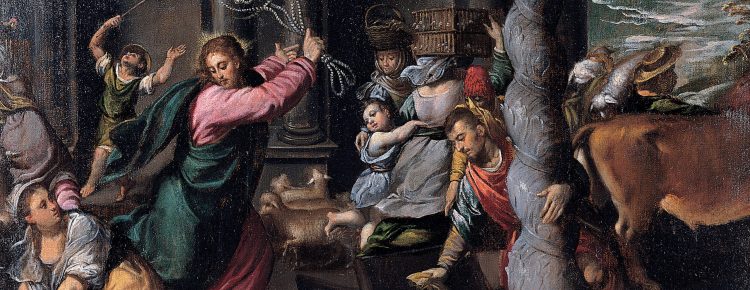This sermon is based on the RCL Gospel text for this week.
In the Gospels of Matthew and Luke the story of Jesus’ temptation in the wilderness is told in great detail – each temptation elaborated upon. But this year the Gospel upon which we focus is Mark, and Mark’s account of Jesus’ 40 wilderness days is told in the briefest of ways – here it is: ‘Jesus was in the wilderness for forty days, tempted by Satan.’
So when we’re reading Mark, I think, for evidence of what went on in those forty days in the subsequent events and stories. And today’s Gospel reading is one of them.
We find this story difficult because the belief that Jesus was without sin, and an account of him losing his temper and throwing tables and chairs around, don’t sit easily together. So we have to ask what on earth was going on here.
It is only a few weeks since we celebrated another event that took place in the Temple – our celebration of Candlemas, or The Feast of the Presentation. We remembered Mary and Joseph making the appropriate sacrifice – they took turtle doves or pigeons. This was the sacrifice for people who didn’t have much money – if you were rich you took a sheep.
So, we can see that the Hebrew Scriptures, our Old Testament, made provision for poor people to participate in the ritual life of the Temple. Jesus’ family wasn’t wealthy – they weren’t destitute, but they were certainly not wealthy.
The trouble was that that Temple Sacrifices had become a bit of a racket. You really had to buy your sacrifices within the Temple precinct – each offering was inspected and had to be without blemish. Those who were responsible for judging this required perfecton had developed a bit of a racket with the Temple money changers , so animals bought outside the Temple were judged inadequate. People had to buy more expensive animals from within the Temple precincts. But the Temple had its own currency, so the money changers got their cut in this scam as well.
We begin to see why Jesus was so angry. Why he turned over the tables, set the animals free, let the birds fly away and drove out the money changers with a whip. Here was a corrupt system which made the hard lives of the poor even harder. Which excluded them from the religious duties which put them right with God. In a way it was not dissimilar to the sale of Indulgences which was one of the religious practices which stoked the fires of the Reformation – the wealthy could buy their way out of Eternal Punishment but the poor would just have to suffer.
Jesus was having none of this. He was, after all, the son of a Mother who had sung about casting down the mighty from their thrones and exalting the humble and meek.
Here, he demonstrates his great passion for inclusion. He demonstrates a faith that challenges corruption and privilege – who said Christianity had nothing to do with politics?
It is good that our faith brings personal comfort, that we’re able to provide church schools for our children to attend. These are both important. It’s an important reason why people worshipped at the Temple – and still do. And why people gather to worship on churches, synagogues, mosques, across the world. But, certainly for Christians, our faith always needs an uncomfortable edge – something that turns us outwards towards those for whom Jesus had the most love, the most concern. To those who, still today are excluded from our common life as a nation or as a church – those who are taken advantage of, abused, or excluded simply because they don’t feel good enough. It is a sad fact that many people feel they’re not posh enough to come to church. Several people have asked me recently if they’re ‘allowed to come’ – we’re seen as exclusive, posh, – even us, here in Knuzden.
It is for this reason that we change things sometimes – make things less formal and more accessible to those on the outside, or conduct worship at the Hall or at school. This doesn’t necessarily mean singing pop songs going groovy – such services can be as just as exclusive as something more traditional – perhaps more so. Doing things differently isn’t always popular, but it’s important. We need to think, if Jesus arrived here this morning, would he take a seat and join in, or would he get out his whip and drive us away? It’s a very disturbing question, harsh and scary to think about – but it’s one we must consider.
This is something so important that Jesus actually appears to have lost his rag and behaved very badly. Here, Jesus appears to be right on the boundary of what we might consider to be sinlessness. It is the very shocking nature of this story that should make us sit up and listen. Here, Mark is telling us something incredibly important about Jesus’ teaching – Jesus, of all people, turning a whip on people. We’d better pay attention. And it was all about access to faith, about who’s in and who’s excluded, about the habit of using faith purely for our own ends. This is a story to make us sit up and listen!

